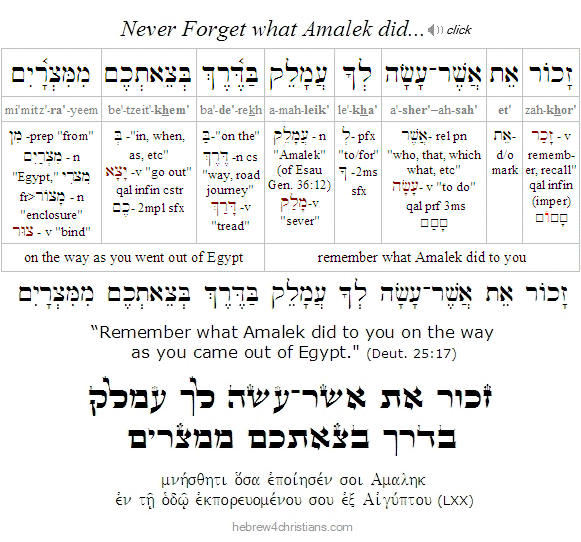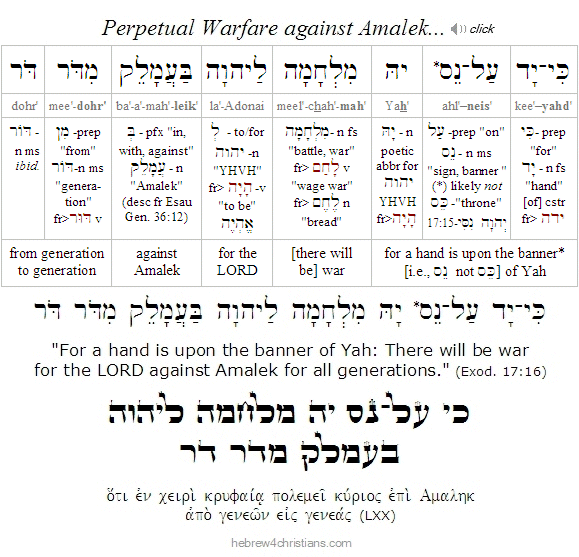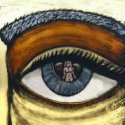|
Our Torah portion this week recalls how the ancient tribe of Amalek attacked the Jewish people when they first left Egypt during the great Exodus:
Remember what Amalek did to you by the way, when you came forth out of Egypt; How he met you by the way, and struck at your rear, all who were feeble behind you, when you were faint and weary; and he did not fear God. Therefore it shall be, when the LORD your God has given you rest from all your enemies around, in the land which God gives you for an inheritance to possess, that you shall blot out the remembrance of Amalek from under heaven; you shall not forget (Deut. 25:17-19).
These verses add some details that were left out of the account given in the Book of Exodus (i.e., Exod. 17:8-16). For example, here we learn that Amalek attacked Israel "from the rear," slaughtering the weakest members of the community first. In addition, we are told that Amalek acted with such cruelty because "he did not fear God" (לא יָרֵא אֱלהִים). Nehama Leibowitz writes, "After the Exodus mankind as a whole might have taken one great step further and acknowledged the sovereignty of the God of justice and truth, but then along came Amalek and, unrestrained by the dread and awe that kept all the nations of the world in check, showed the way for the others. What was there to fear? That a people had gone forth from the land of Egypt. Now they were wandering in the wilderness, weary and struggling. Why should they not be attacked? This was the way of the world..." (Leibowitz: Studies in the Parshah). Yes, that's surely "the way of the world" - to bully the weak, to terrorize the righteous, to practice cruelty, and to engage in bloodlust. It is the common approach of nearly all governments in the world and the preferred approach of various religious cults that refuse to truly "fear the LORD...."
Hebrew Lesson
Deut. 25:17 Hebrew reading (click):
 |
God does not want us to forget the attack by Amalek since it symbolizes all subsequent spiritual warfare in the lives of His people. Recall that while the battle raged, Moses (accompanied by Aaron and Hur) went to the top of the hill holding his staff. When he raised his hands in prayer to the LORD, the Israelites prevailed, but once Moses' hands became heavy, the Amakelites prevailed. The battle lasted until sunset, when Amalek was finally defeated. It was an all-day battle, fought in the light.... To commemorate the victory, Moses built an altar and called it, Adonai Nissi (יהוה נִסִּי) - the LORD is my banner (or the LORD is my Miracle), saying, "for a hand is upon the LORD's banner -- the LORD will war against Amalek for all generations" (Exod. 17:16). Moses' outstretched hands were as "a hand upon the banner of the LORD." Likewise, our victory in the battle against spiritual darkness comes through persistent appeals to the LORD for help...
Hebrew Lesson
Exodus 17:16 Hebrew reading (click):
 |
Just as the Torah commands us to remember (זָכוֹר) the Shabbat to keep it holy (Exod. 20:8); to remember (זָכוֹר) the Passover redemption (Exod. 13:3), and to remember (זָכוֹר) what God did to Miriam (Deut. 24:9), so we are commanded to remember (זָכוֹר) what Amalek did to Israel (Deut. 25:17). To fulfill this commandment, Jewish tradition publicly recites these verses on the Shabbat before Purim (called Shabbat Zachor) so that the 'wiping-out' of Amalek might be connected with the 'wiping-out' of Haman the Agagite, i.e., a descendant of Amalek (Esther 3:1). In addition, it is customary for Jewish soferim (scribes) to literally blot out the name Amalek when they test their quills before writing a Torah scroll....

There is a paradox in the commandment, however, since how can the memory of Amalek be "blotted out" if are commanded to recall it? How it is possible to "remember" something God wants us to forget? After all, if the LORD wanted the Amalekites to be forgotten, then why mention their name? Why should we be commanded to remember Amalek at all?
It should be clear that "Amalek" denotes something more than a particular wicked tribe that attacked the children of Israel. No, Amalek symbolizes the collective "children of darkness" and servants of evil that abound in the world. Historically, Amalek may have been a grandson of Esau and chief of an Edomite tribe (Gen. 36:12, 16), but he is also described as "first among the nations" (רֵאשִׁית גּוֹיִם), even predating the time of Abraham (Gen. 14:7, Num. 24:20). In Augustine's terms, Amalek represents the "City of the World," whereas Israel represents the "City of God." It is in this sense that "Amalek" represents children of darkness in this world, the perpetual enemies to the Kingdom of God: "The LORD will have war with Amalek from generation to generation" (Exod. 17:16).
The name "Amalek" (עֲמָלֵק) begins with the letter Ayin (symbolizing the eye) and equals 240 in gematria -- the same value for safek (סָפֵק), the Hebrew word for doubt. Amalek therefore suggests "the eye of doubt," or even "the severed eye" (the Hebrew verb מָלָק means "to chop" or "sever" in reference to the "eye" of Ayin). Amalek therefore represents spiritual blindness as it acts in the world... God used the tribe of Amalek to attack Israel during the time of the Exodus because the people doubted the LORD by asking one another, "Is the LORD among us or not?" (Exod. 17:7-8). Note that the gematria of Haman (הָמָן) is 95 - the same as for ha-melekh (הַמֶלֶךְ), "the king," suggesting that people like Haman are invested with power whenever we doubt the Divine Presence in our midst.
Wiping out Amalek, then, is a call to spiritual warfare, and the weapon of our warfare is the truth of the salvation of God lived out on our lives (2 Cor. 10:4). We must "cast of the works of darkness and put on the weapons (τὰ ὅπλα) of light" (Rom. 13:12). We practice the ministry of reconciliation using "truthful speech, and the power of God; with the weapons of righteousness (τῶν ὅπλων τῆς δικαιοσύνης) for the right hand and for the left" (2 Cor. 6:7). We are to present the use of our bodies to God as "weapons (ὅπλα) for righteousness" (Rom. 6:13). Unlike the doubtful Amalek, the righteous are called to walk in emunah (faith) with ayin ha-tovah ("the good eye") of trust. We are called "children of light" (בְּנֵי הָאוֹר) who walk in the light (John 12:36; Eph. 5:8; 1 Thess. 5:5; 1 John 1:7).
וּבְחַסְדְּךָ תַּצְמִית איְבָי וְהַאֲבַדְתָּ
כָּל־צֲררֵי נַפְשִׁי כִּי אֲנִי עַבְדֶּךָ׃
oov·chas·de·kha · tatz·meet · oy·ye·vai · ve·ha·a·vad·ta
kol'-tzo·ra·rei · naf·shee · kee · a·nee · av·de'·kha

"And in your steadfast love you will cut off my enemies, and you will destroy
all the adversaries of my soul, for I am your servant."
(Psalm 143:12)
The Targum Yonatan says, "you shall blot out the memory of Amalek from under the heavens; but of the days of the King Messiah you shall not be unmindful." The commandment to "blot out" Amalek ultimately will ultimately be fulfilled in the Messianic Kingdom to come, "when the LORD your God has given you rest from all your surrounding enemies in the land the LORD your God is giving you as your inheritance to possess" (Deut. 25:19). At that time all memory of Amalek will be "blotted out" from under heaven just as God will "wipe away" all tears from our eyes... This is a glorious truth we should never forget, despite the condition of this world and the apparent upper hand of the "Amalekites."
Meanwhile we are engaged in spiritual warfare and must be armed for the battle. "Since therefore the Messiah suffered in the flesh, arm yourselves (ὁπλίζω) with the same way of thinking" (1 Pet. 4:1). Be sober and vigilant. Put on the whole armor of God, because we wrestle against spiritual forces of evil at work in the world today (Eph. 6:10-18). "Be watchful, stand firm in the faith, act like men (ἀνδρίζω), be strong" (1 Cor. 16:13). In God's power you will "tread upon the lion and cobra; the young lion and the serpent you will trample down" (Psalm 91:13; Luke 10:19). May the LORD help us "stand firm in one spirit, with one mind fighting together (i.e., συναθλέω from συν, "with" and ἀθλέω, "contend," "fight") for the faith of the gospel" (Phil. 1:27). Amen.
|




